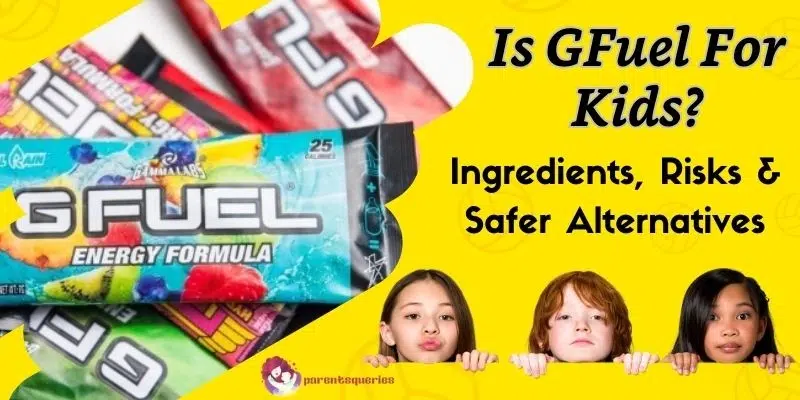Is GFuel For Kids? Ingredients, Risks & Safer Alternatives
As a parent, you want to provide the best nutrition for your children. With the growing popularity of energy drinks among teens, it is important to evaluate whether these products are safe for kids or not. Today we will be discussing is GFuel for kids, its ingredients, potential risks, and safer alternatives. We will discuss each element in detail so that you can make an informed decision when it comes to your child’s health.
Can kids drink GFuel? GFuel is a popular energy drink that has gained massive recognition among gamers and athletes alike. Its unique blend of ingredients promises to boost mental focus and physical endurance, making it an appealing choice for people who need that extra push to perform at their best. However, when it comes to children, GFuel is not the best option for those under 18.
Firstly, GFuel is known for its high caffeine content, which can lead to several health issues in kids such as anxiety, jitteriness, and insomnia. The American Academy of Pediatrics recommends that children should avoid consuming energy drinks altogether due to the potential risks they pose. Additionally, GFuel contains other stimulants like taurine and guarana that may exacerbate these side effects in young users.

GFuel and Kids – What To Know
GFuel is a popular energy drink that has been marketed toward the gaming community. With its bright colors and unique flavors, many kids have become fans of this beverage. However, parents should be aware of some important facts before allowing their children to consume GFuel.
What Is GFuel?
GFuel is a popular energy drink that has taken the market by storm in recent years. It was created specifically for gamers, but its appeal has since expanded beyond just the gaming demographic. GFuel is marketed as a healthier alternative to traditional energy drinks, as it contains no sugar and only 25 calories per serving.
One of the key ingredients in GFuel is caffeine, which provides an instant boost of energy that can help improve focus and concentration. In addition to caffeine, GFuel also contains other natural ingredients such as vitamins, antioxidants, and amino acids. These ingredients not only provide sustained energy throughout the day but also support overall health.

GFuel comes in a variety of flavors, from fruity options like blue ice and tropical rain to more unique offerings like sour cherry and bubble gum. The company also partners with popular gaming influencers to create signature flavors that are exclusive to its brand.
Is GFuel Healthy?
The answer to this question depends on what you consider “healthy.” GFuel does not contain any calories or sugar, which can help reduce your overall calorie intake and prevent weight gain. Additionally, it contains vitamins and antioxidants that can boost your immune system and improve your overall health. However, GFuel also contains caffeine and other stimulants that can cause jitteriness, anxiety, and sleep disturbances if consumed in excess. Check Can Babies Eat Jello?
If you are looking for a quick boost of energy for gaming or studying purposes, then GFuel may be a good choice for you.
GFuel Ingredients

One of the key ingredients in GFuel is caffeine, which provides an instant energy boost to help you power through your day. Additionally, it contains green tea extract, which has been shown to improve brain function and physical performance. It also features taurine, an amino acid that supports cardiovascular health and helps regulate blood sugar levels.
Another noteworthy ingredient in GFuel is L-theanine, an amino acid found in green tea leaves that promotes relaxation and reduces stress without causing drowsiness.
Artificial Sweeteners, Colors, and Preservatives
Silicon Dioxide:
Silicon dioxide is a naturally occurring mineral that is often used as an anti-caking agent or thickener in processed foods. It is also added to supplements and medications as inactive ingredients. While it is generally recognized as safe by the FDA, some studies suggest that prolonged exposure to high levels of silica can lead to lung cancer and other respiratory diseases.
Despite these concerns, silicon dioxide continues to be widely used in food production due to its low cost and effectiveness. However, consumers can take steps to limit their exposure by choosing whole foods instead of highly processed ones with additives like silicon dioxide.
Citric Acid:
Citric acid is a natural compound found in citrus fruits like lemons and limes. However, the citric acid used in food processing is typically produced through chemical synthesis. It is commonly used as a flavor enhancer or preservative in many packaged foods and drinks. While it is generally recognized as safe by the FDA, some studies suggest that consuming large amounts of citric acid could lead to digestive issues or exacerbate symptoms of certain medical conditions.
Red, Yellow, and Blue Dyes:
One group of additives that have come under scrutiny in recent years is red, yellow, and blue dyes. These synthetic colorants are widely used in everything from candy to cereal to cosmetics. While they may make products look more appealing to consumers, some studies suggest that they could have negative impacts on our health.
For example, some research has linked certain red dyes with hyperactivity and other behavioral problems in children. Yellow dyes have also been associated with increased hyperactivity in some people.
Sucralose:
Sucralose is 600 times sweeter than sugar. It is widely used in various food products like diet soda, chewing gum, and baked goods.
Sucralose has been approved by several regulatory bodies across the world as safe for human consumption. However, some studies suggest that it may have adverse effects on our health. Some researchers believe that sucralose can alter our gut bacteria composition and lead to digestive problems. Others claim that it can increase the risk of developing diabetes by affecting insulin sensitivity.
Despite these concerns, sucralose continues to be a popular choice for manufacturers due to its low-calorie content and high sweetness level. Consumers should always read product labels carefully before purchasing any item containing artificial sweeteners or preservatives.
Maltodextrin:
Maltodextrin is a white powder made from corn, rice, or potato starch which acts as a thickener and filler in many packaged foods. It’s often added to products like salad dressings, sauces, and beverages to improve their texture and shelf life. Despite being derived from natural sources, some studies suggest that maltodextrin can spike blood sugar levels in people with diabetes.
Acesulfame Potassium:
Acesulfame Potassium has been approved by the FDA as a safe substance for consumption. However, some people may experience side effects like headaches or digestive issues when consuming it in large amounts. It’s important to note that Ace-K is often used in combination with other artificial sweeteners like sucralose or aspartame.
In addition to Acesulfame Potassium, many processed foods contain artificial colors and preservatives that have been linked to health concerns such as hyperactivity in children or cancer risks. It’s important for consumers to read food labels carefully and choose whole foods whenever possible to avoid these additives.
Energy Complex
Taurine:
Taurine is a naturally occurring amino acid that has been gaining popularity in the world of sports and energy drinks. It plays an essential role in various bodily functions, including the cardiovascular system, skeletal muscles, and nervous system. Taurine is also found in many animal-based foods like fish and meat; however, it’s mostly consumed through supplements or energy drinks.
One of the benefits of taurine is its ability to improve athletic performance by increasing muscle strength and reducing fatigue. It also helps regulate the body’s electrolyte balance during intense exercise, leading to better endurance and faster recovery time. Due to these benefits, taurine has become a popular ingredient in pre-workout supplements.
Apart from its physical effects, taurine can also have positive impacts on brain function.
L-Citrulline Malate:
L-Citrulline Malate is an amino acid compound that plays a vital role in enhancing physical performance. It works by increasing blood flow to the muscles, reducing fatigue, and improving endurance levels during exercise. Additionally, it helps to remove toxins such as lactic acid from the body which can lead to muscle soreness and fatigue.
Energy Complex provides an effective way for athletes to improve their overall performance without resorting to harmful substances or chemicals. The inclusion of L-Citrulline Malate ensures that users are getting a safe and natural source of energy, making it an ideal choice for those looking to achieve their fitness goals safely and effectively.
Caffeine:
Caffeine is a natural stimulant found in coffee, tea, and chocolate. It works by blocking adenosine receptors in the brain which causes an increase in dopamine production. This leads to improved mood, increased focus, and decreased fatigue. Many energy supplements contain caffeine because of its ability to improve cognitive function and physical performance.
While caffeine can be helpful for increasing energy levels, it’s important to not overdo it.
Glucuronolactone:
A natural compound that has been shown to improve mental clarity and physical performance. This ingredient is found naturally in the body but can also be obtained through supplements.
Glucuronolactone has been found to have several benefits beyond just providing an energy boost. It has been shown to help detoxify the liver and improve overall liver function, which can lead to increased energy levels and better overall health. Additionally, it has been linked to improved mood and decreased feelings of fatigue.
Another benefit of Glucuronolactone is its ability to enhance cognitive function. Studies have shown that it can improve memory, concentration, and reaction time.
L-Acetyl-L-Carnitine HCL:
This natural compound is found in small amounts in our bodies, but it can also be taken as a dietary supplement to unlock its many benefits.
One of the key benefits of L-Acetyl-L-Carnitine HCL is that it helps transport fatty acids into our cells’ mitochondria, where they can be used as fuel for energy production. This means that supplementing with L-Acetyl-L-Carnitine HCL can help increase endurance and reduce fatigue during exercise, making it an excellent choice for athletes or anyone looking to improve their physical performance.
Velvet Bean Seed Extracts:
Velvet Bean Seed Extracts have gained popularity due to their natural ability to enhance mental and physical performance. With its rich source of L-dopa, Velvet Bean Seed Extracts are becoming increasingly popular for those seeking an alternative to caffeine-based energy drinks.
Velvet Bean Seed Extracts have been used in traditional medicine for centuries, primarily as a mood enhancer and aphrodisiac. However, recent studies have shown that its effects extend beyond just improving mood and libido. The extract contains high levels of dopamine, a neurotransmitter that plays an important role in movement control and the reward system of the brain. This makes it ideal for athletes looking to improve their performance or individuals who require a quick energy boost during work or study.
Focus Complex
L-Tyrosine:
L-Tyrosine is an amino acid that plays a crucial role in the production of neurotransmitters like dopamine and norepinephrine. These chemicals are responsible for regulating mood, motivation, and focus. By supplementing with L-Tyrosine as part of your daily regimen, you can enhance your brain’s ability to produce these neurotransmitters, giving you the mental clarity and energy boost necessary to tackle any task at hand.
N-Acetyl-L-Tyrosine:
N-Acetyl-L-Tyrosine is one of the key components in the Focus Complex. This amino acid derivative has been shown to improve memory recall and enhance mental alertness. It works by increasing dopamine levels in the brain, which helps regulate mood and motivation. Additionally, N-Acetyl-L-Tyrosine can also help reduce stress levels and promote an overall sense of well-being.
Adenosine-5-Triphosphate Disodium Salt:
Adenosine-5-Triphosphate Disodium Salt, or ATP for short, is a molecule responsible for transferring energy within cells. It’s a vital component of every human cell and powers our body’s most critical functions. ATP is particularly important in the brain, where it plays a crucial role in cognitive function and neural activity.
The Focus Complex is a supplement designed to maximize the benefits of ATP in your brain. Its unique blend of ingredients works together to enhance focus, memory, and mental clarity. By improving blood flow and oxygen delivery to the brain, The Focus Complex helps you stay alert and focused throughout the day.
In addition to Adenosine-5-Triphosphate Disodium Salt, The Focus Complex contains other essential nutrients like Ginkgo Biloba extract and Bacopa Monnieri extract.
Antioxidant Complex
Antioxidants are a vital component of our body’s defense system against free radicals – unstable molecules that can cause cellular damage and lead to chronic diseases such as cancer, heart disease, and Alzheimer’s. While the body produces some antioxidants on its own, it is also essential to consume these nutrients through diet or supplements. Many people turn to antioxidant complexes for this purpose.
Antioxidant complexes are a combination of different antioxidants working together to provide optimal protection against oxidative stress. These complexes typically include vitamins C and E, beta-carotene, selenium, zinc, and other plant-based compounds like flavonoids and polyphenols. By consuming a comprehensive antioxidant complex regularly, you can boost your immunity levels and reduce the risk of chronic diseases in the long run.
How Much Caffeine Is in GFuel?
According to the GFuel website, each serving of their energy drink contains 140mg of caffeine. This amount is comparable to other popular energy drinks on the market, such as Red Bull and Monster Energy. The recommended serving size for GFuel is one scoop per 12-16 ounces of water, which means that if you follow these instructions, you will be consuming 140mg of caffeine per serving.
It’s worth noting that while some people may find this amount of caffeine excessive or too stimulating for their bodies, others may have no adverse reactions at all.
Effects of Caffeine on Children
Caffeine intake has become a norm in modern society, with children and teenagers consuming high quantities of energy drinks, soda, coffee, and tea. While caffeine provides a temporary boost of energy and alertness, it is important to understand its effects on the developing minds and bodies of children aged 12-18. Experts recommend that children should not consume more than 100mg of caffeine per day since an excessive amount can have negative impacts on their health.
Caffeine stimulates the nervous system by increasing heart rate, blood pressure, respiration rates, and brain activity. However, excessive caffeine can cause anxiety disorders in kids leading to restlessness, agitation, or even insomnia. Furthermore misusing energy drinks due to high levels of sugar or other stimulants commonly found in them also leads to obesity problems among children. Therefore parents are encouraged to monitor their child’s caffeine intake closely.
How Much Lead Is in GFuel?
GFuel is a popular energy drink with a massive fan following, particularly among gamers and fitness enthusiasts. However, there have been concerns about the lead content in the drink. Lead is a harmful substance that can cause significant damage to our bodies when consumed in high amounts. Therefore, it’s essential to understand how much lead is present in GFuel and whether it’s safe for consumption. You may like to read Why Is Baby-Led Weaning Good? on our website.
GFuel contains natural and artificial ingredients such as caffeine, amino acids, vitamins, and minerals that boost energy levels and enhance performance. However, like most energy drinks on the market today, GFuel also contains lead. The company claims that its products are safe for consumption and meet all regulatory standards set by the Food and Drug Administration (FDA). Nevertheless, it’s crucial to evaluate what these standards are regarding lead content.
GFuel Side Effects
Here are some of the most common GFuel side effects to be aware of.
Firstly, GFuel contains caffeine which can cause jitters, increased heart rate, and anxiety if consumed in large quantities. Some people may also experience headaches or migraines as a result of consuming too much caffeine. Additionally, GFuel contains taurine which has been linked to insomnia and restlessness.
Secondly, some people may have an allergic reaction to one or more ingredients in GFuel. Symptoms such as hives, itching, or swelling may occur after drinking the beverage. It’s important to check the label for any allergens before consuming GFuel.
Is GFuel for Kids?
The manufacturer of GFuel claims that the product is safe for children, but as parents or guardians, we need to understand what’s in this energy drink before giving it to our kids.
GFuel contains caffeine, which is a stimulant that can boost focus and alertness. However, too much caffeine can lead to jitters, insomnia, and headaches in children who are sensitive to its effects. Additionally, GFuel also contains sugar substitutes like sucralose which could be harmful when consumed in large quantities by kids.
While GFuel may not be particularly harmful to your child’s health when consumed moderately, parents should exercise caution when allowing their children to consume it.
Energy Drink Age Limit
Firstly, it is important to understand that energy drinks contain high levels of caffeine, which can lead to adverse health effects if consumed excessively or by individuals who are sensitive to caffeine. In addition to caffeine, most energy drinks also contain sugar and other stimulants such as taurine and guarana. These ingredients can cause increased heart rate, anxiety, insomnia, headaches, and even seizures.
According to health experts, children under the age of 18 should not consume energy drinks at all due to their developing bodies being more susceptible to negative side effects from high levels of caffeine.
Sports Drinks vs. Energy Drinks
Sports drinks and energy drinks are popular beverages among athletes and fitness enthusiasts alike. While both provide a burst of energy, they differ in their composition, purpose, and effects on the body. Sports drinks are designed to hydrate and replenish electrolytes lost during exercise, while energy drinks contain high amounts of caffeine and other stimulants to boost alertness and focus.

Sports drinks typically contain water, sugar, electrolytes such as sodium and potassium, and sometimes vitamins. They are formulated to replace fluids lost through sweating during intense physical activity. Electrolytes play a crucial role in regulating fluid balance in the body and help prevent dehydration. The added sugar provides an immediate source of energy for muscles to continue performing at peak levels.
On the other hand, energy drinks usually contain caffeine, taurine, B vitamins, and other ingredients aimed at enhancing mental alertness and physical performance.
Kid-Friendly Energy Drinks
As a parent, you may be concerned about your child’s energy levels and ability to focus throughout the day. However, the idea of giving them an energy drink may make you uneasy due to concerns about high sugar and caffeine content. Fortunately, there are now several kid-friendly energy drinks on the market that offer a healthier alternative.
One option is to try a natural energy drink made with ingredients like green tea extract or yerba mate. These drinks can provide a gentle boost of energy without the jitters associated with caffeine overload. Additionally, some brands have added vitamins and minerals like B12 and magnesium to support healthy brain function.
Another option is to look for low-sugar or sugar-free options that use natural sweeteners like stevia or monk fruit instead. This is especially important for children who may already consume too much sugar in their diet.
Related Questions:
Conclusion
Gfuel is not suitable for young children. It contains a significant amount of caffeine that can cause adverse health effects in kids and adolescents. However, there are healthier alternatives like water or even an energy drink that contains less caffeine. Parents should always be mindful of what they give their children and should consult a physician before making any decisions about dietary supplements. With careful consideration and research, parents can make sure their children get enough nutrients without compromising their health.






